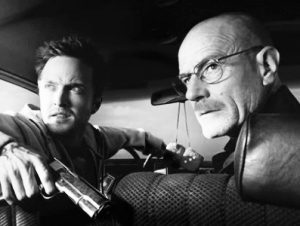 A couple weeks ago, I found myself seething with rage as I read the recap of the Emmy Awards.
A couple weeks ago, I found myself seething with rage as I read the recap of the Emmy Awards.
I’ve been quite adamant in my support for AMC’s Breaking Bad over the years, so imagine my frustration seeing Bryan Cranston, Aaron Paul, and Jonathan Banks each lose in their respective categories. After all, Breaking Bad now has a solid place in the top tier of television series with its final season ending nearly flawlessly.
However, the more I think about it, I shouldn’t be upset. First, this is just an awards show, a flawed one at that. Yet, more importantly, this year’s Emmy Awards proved that the wealth of quality television today is quite rich.
Sometimes people tell me that they don’t watch TV with a superior attitude, but I pity these people because TV programming has never been better.
Television is in the midst of its golden age. Since the emergence of cable networks like HBO, AMC, and FX, the medium has been on an upward swing, creating some of the most unforgettable storytelling and characters of the century thus far.
Sure, plenty of what hits the air is nothing but savage torpor (I’m looking at you, Two and a Half Men), but the quality—and quantity—of the very best on television strongly suggests the transition of the small screen to the big time.

Compared to the film industry, which has been on an unfortunate downward spiral to high-action and low-intellect franchises, since Star Wars captivated audiences in 1977, television has only gotten stronger in the past twenty years. The early 1990s introduced a new era in the medium, with series like Seinfeld, The Larry Sanders Show, Twin Peaks, and Homicide: Life on the Street, changing the status quo of network television.
With HBO’s foray into dramatic television in the late 90s, a new era of television began, as Oz and The Sopranos showed audiences what the small screen was capable of doing. The creative freedoms afforded through cable offered a new creative license that had otherwise been nonexistent until then, and television—and its audiences—has never looked back.
With the emergence of The Sopranos in the early 2000s, television has been on an incredible upswing in quality and quantity, with premium cable channels like HBO and Showtime becoming more popular for their original programming than for their all-day film showings. Standard cable channels like AMC and FX have stepped up their game considerably following the HBO paradigm by creating programming that is challenging and entertaining for viewers.
For the last decade, audiences have been treated to the best the art form has to offer. Television has offered themes as rich as the roles of families in the crime world in The Sopranos, the rise and fall of institutions in Deadwood and The Wire, the changing social structure in Mad Men, the poisonous nature of power in Game of Thrones, the monotonous malaise of a man’s middle ages in Louie, and the unveiling of evil in Breaking Bad.
I have always had a hard time believing that any major art form will ever be at its zenith during my lifetime, but television has done just that. The acting, the direction, and the writing have so vastly improved in the last ten years that television, once thought of as a lesser art (often not even considered to be an art) is now reaching such great heights.
It’s no surprise that a film actor like Kevin Spacey chose to do Netflix’s House of Cards. The best writers are in television, and the best actors and directors — including House of Cards’ David Fincher—are consequently flocking there, too.
When I hear someone proudly tell me that they don’t watch TV, I will only shake my head in disdain, because that individual is shutting him or herself off to the best of an art form at the top of its game.
While I might be annoyed that Jeff Daniels won an Emmy, I really should be glad; television has never been better, and given the nature of Hollywood, who knows how long this success will last?